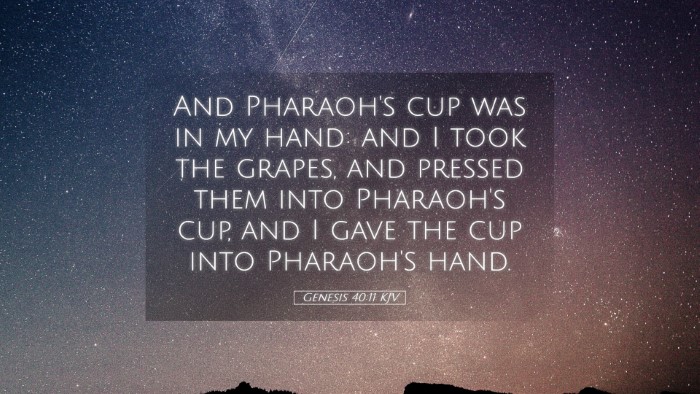Commentary on Genesis 40:11
Verse Overview: Genesis 40:11 states, "And Pharaoh's cup was in my hand; and I took the grapes, and pressed them into Pharaoh's cup, and I gave the cup into Pharaoh’s hand." This verse is part of the narrative surrounding Joseph’s interaction with Pharaoh’s cupbearer and baker while in prison. This profound moment unfolds insight into God’s providential care and the themes of faith and redemption.
Contextual Background
The setting for this verse is a time of great testing for Joseph, who has been wrongfully imprisoned. Genesis 40 details a significant event where Joseph interprets dreams for the cupbearer and the baker. In this particular verse, the cupbearer's dream is being recounted, illustrating the nature of his role and the implicit responsibilities that come with it.
The Symbolism of the Cup
Matthew Henry's Insight: Henry notes that the cup represents joy and fellowship, used to symbolize God's blessings in the life of a believer. The act of pressing grapes into the cup signifies the transformation of raw experience into something precious that can be offered to another.
Albert Barnes' Commentary: Barnes highlights the significance of the cupbearer’s role, wherein he was entrusted with the cup, suggesting a deep sense of loyalty and serve. Perhaps, thus, it indicates more than just a physical act; it reflects a spiritual responsibility to serve and honor the king rightly.
Divine Providence
This narrative serves to remind readers of the overarching theme of God's providence throughout Scripture. The placement of Joseph in prison, where he meets the cupbearer, is pivotal. Adam Clarke writes: "Joseph’s circumstances were orchestrated for a higher purpose, with every encounter preordained to lead to his eventual elevation." Clarke emphasizes that even in dire situations, God has a plan that is often hidden from our understanding.
The Interpersonal Dynamics
Understanding the relationships between Joseph, the cupbearer, and Pharaoh reflects the complexities of their roles. The cupbearer’s act of sharing his dream with Joseph indicates a moment of vulnerability that leads to a transformational event.
Trust and Dependence
Joseph's ability to interpret dreams is a divine gift, and this moment underscores the theme of trust. The cupbearer's trust in Joseph's interpretation plays a crucial role in the unfolding of God’s plan. Henry expounds: "Trust, even when diminished by circumstances, opens the way for divine revelation and support.” This dynamic showcases a deep reliance not only on human relationships but ultimately on God’s providential orchestration.
Theological Implications
The theological significance of Genesis 40:11 lies in its development of key biblical themes:
- Redemption: The act of the cupbearer receiving a new beginning post-interpretation symbolizes God’s redemptive work in the lives of His people.
- Suffering and Hope: Joseph's journey from prisoner to ruler illustrates that periods of suffering may serve to prepare believers for their future calling.
- God’s Sovereignty: This passage is a testament to the sovereignty of God in human affairs, guiding the lives of individuals toward His ultimate plan.
Applications for Today’s Believers
This narrative offers profound lessons for modern believers, especially for pastors, students, and theologians:
- Faith in Adversity: Joseph teaches the importance of maintaining faith during life’s trials, trusting in God's greater plan even in the lowest points.
- Empathy and Service: The role of the cupbearer speaks to the need for authentic relationships where individuals encourage and serve each other.
- Intercessory Prayer: Joseph’s willingness to interpret dreams can inspire leaders to be intercessors for others, seeking God’s guidance for those entrusted to their care.
Conclusion
Genesis 40:11 encapsulates a transformative moment in the life of Joseph, laden with symbolic meaning and theological depth. This verse illustrates God’s intricate plan woven through human interaction and the consequences thereof. Ultimately, it prompts reflection on God’s sovereign hand in the tapestry of life, encouraging all believers to trust in His guidance.


